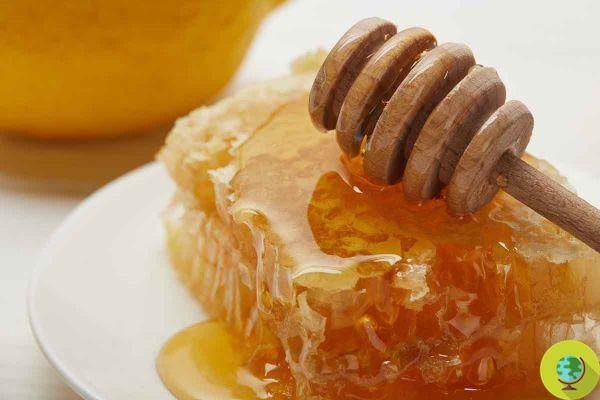
Raw honey is what bees eat, natural, unpasteurized and full of benefits. However, it is more difficult to find on the market
Don't store avocado like this: it's dangerousThe properties of honey are known to everyone but what you may not know is that there is a certain difference between traditional honey, which we commonly buy in shops and supermarkets, and raw honey, i.e. unpasteurized. Let's find out all the amazing benefits of this completely natural variant.
First of all we understand well what it is. By raw honey we mean raw honey which therefore has not undergone any heat treatment, that is, it has not been pasteurized. Precisely for this reason it keeps a greater amount of nutrients intact.
Raw honey, which is what bees feed on, is taken directly from the honeycomb and simply purified of dirt, wax and other substances, before being placed in the jar where we can then buy it. In practice, unlike traditional honey, it does not undergo any pasteurization or filtration process, which gives it its characteristic cloudy appearance.
We must not confuse raw honey with organic honey, the latter wording in fact does not indicate that the product is raw but only that the bees are not given any treatment based on antibiotics or other medicines. A great thing of course, but if we are looking for raw honey we must find this specific characteristic shown on the label.
In pasteurized honey, which is found much more frequently on the market, the filtration process gives the product that clear and more pleasing aspect to consumers but this also removes some beneficial substances present inside, such as pollen.
Now let's find out what are the main benefits of raw honey.
Index
Antibacterial
Raw honey has antibacterial properties, which makes it an effective treatment for wounds and infections. In fact, it contains an enzyme that produces hydrogen peroxide (a substance that we often use to disinfect wounds), this obviously does not mean that we must use raw honey like a medicine, but it can still be convenient to include it among our natural remedies.
Rich in antioxidants
Raw honey contains over 30 different polyphenols, 22 amino acids, and a wide variety of vitamins and minerals. Polyphenols are responsible for the high level of antioxidants in raw honey, these are precious substances that help the body protect itself from free radicals. The pasteurization process the honey undergoes kills, at least in part, these powerful phytonutrients.
Anti-inflammatory
Raw honey contains pollen which is able to fight inflammation and adds great nutritional value to this food, especially in terms of fatty acids, vitamins and minerals and amino acids. It also improves liver function and can help prevent heart disease and stroke.
Probiotic and digestive
Honey is sometimes used to treat gastrointestinal problems such as diarrhea, although there isn't much research to show that it really works in this regard. However, its efficacy is proven in the treatment of the bacterium Helicobacter pylori (H. pylori), a common cause of stomach ulcers.
Raw honey is also a powerful probiotic, which means it feeds the good bacteria that live in the gut. The health of these microorganisms is fundamental not only for the gastrointestinal system but for the well-being of the whole organism.
Against sore throat
Raw honey is very effective against sore throats and is perfect to add to a hot drink when you have a cold. It can also help soothe a cough.
Despite all these benefits, it is good not to overdo it with raw honey as we always talk about a sugar. It should be consumed in moderation, not exceeding the dose of 1 maximum 2 teaspoons per day.
The risks
In addition to the many benefits, the raw honey variant also has some risks.
It is vital to know that raw honey may contain a bacterium called Clostridium botulinum, which can be dangerous for i children under the age of one year who therefore should never consume honey.
Symptoms of botulism poisoning in infants can include:
- constipation
- slow breathing
- drooping eyelids
- loss of head control
- paralysis that spreads downward
- lack of appetite
- lethargy
- weak crying
Follow us on Telegram | Instagram | Facebook | TikTok | Youtube
Fonte: Health Line
Read also:
- Raw honey: the natural alternative to antibiotics against super resistant bacteria?
- Honey: is it really possible to recognize 100% pure honey?
- Honey: 5 extraordinary healing properties
- The best honey to buy in the supermarket according to experts


























